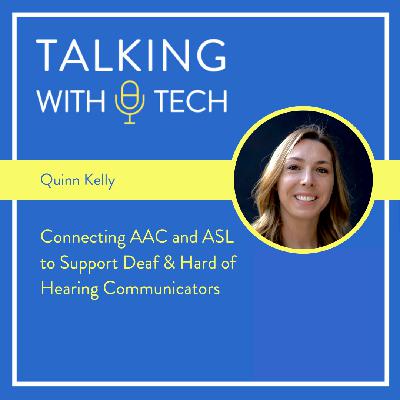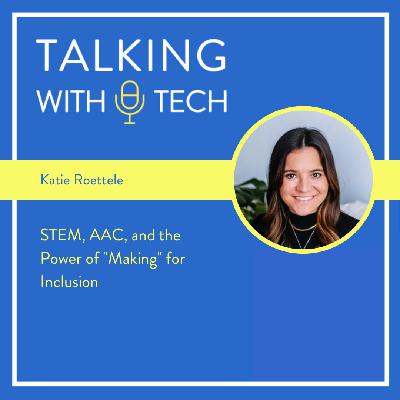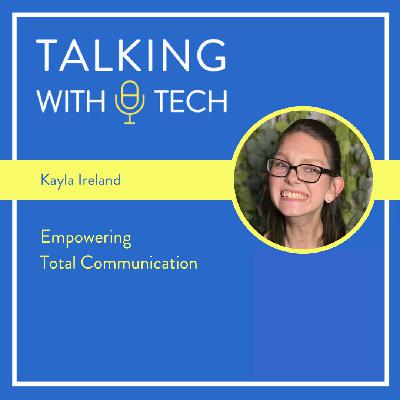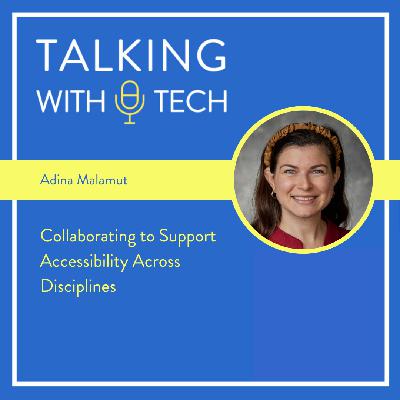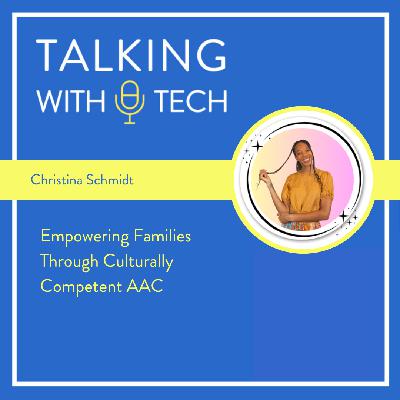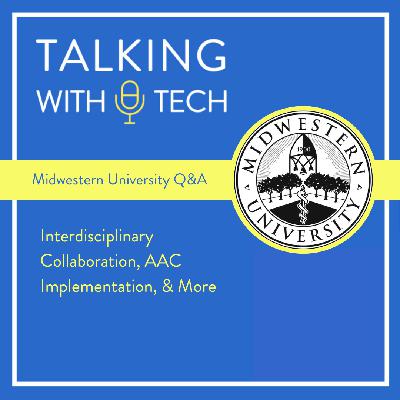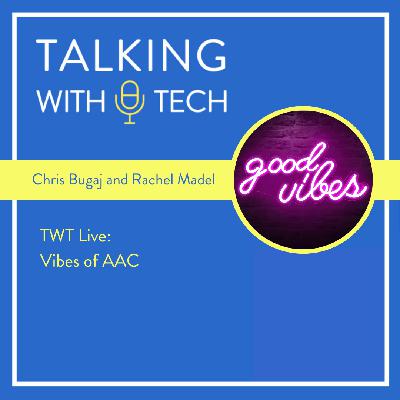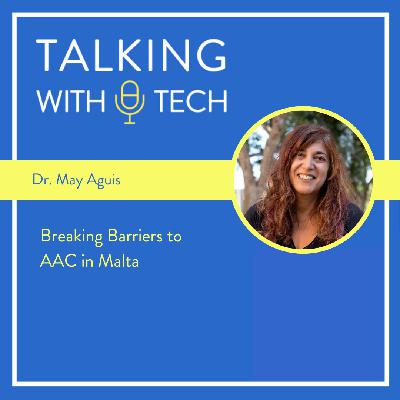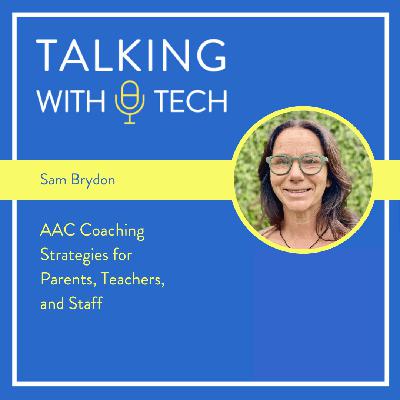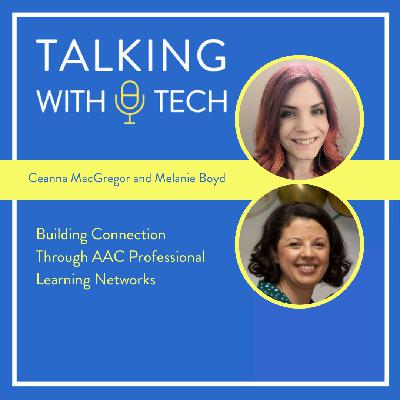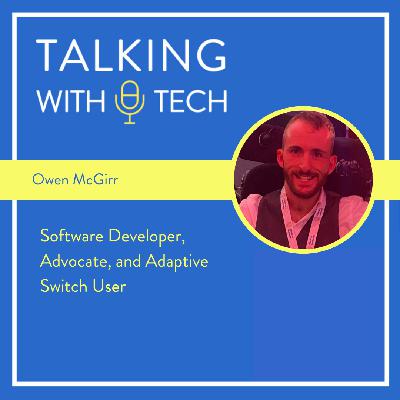Discover Talking With Tech AAC Podcast
Talking With Tech AAC Podcast

Talking With Tech AAC Podcast
Author: Rachel Madel and Chris Bugaj
Subscribed: 568Played: 13,971Subscribe
Share
© Copyright 2020 All rights reserved.
Description
How do people with complex communication needs learn to use augmentative and alternative communication (AAC)? Join speech-language pathologists (SLPs) Rachel and Chris as they answer your questions, discuss relevant research and give you updates on the latest and greatest developments in the field of AAC! Interviews with industry thought-leaders, clinicians, parents, researchers, users, and app developers help you stay up-to-date on the latest devices and apps, best practices for device selection and implementation, ideas for working with communication partners, and more!
352 Episodes
Reverse
This week, we share Rachel’s interview with Quinn Kelly! Quinn Kelly is a bilingual speech-language pathologist who specializes in working with children who use both AAC and American Sign Language (ASL). She serves on the AAC committee for the New Jersey Speech and Hearing Association and works with Language First, an organization supporting professionals serving deaf and hard-of-hearing students. In this episode, Quinn shares her expertise on the intersection of AAC and ASL, advocating for culturally sensitive, individualized, and collaborative approaches to communication support.
Key Ideas this Week:
The Intersection of AAC and ASL Requires Cultural and Clinical Sensitivity – Quinn Kelly emphasizes that not all deaf or hard-of-hearing individuals are ideal candidates for AAC, and decisions must consider cognitive, motor, visual, and cultural factors. Professionals should avoid a one-size-fits-all approach and ensure AAC supports are culturally and linguistically respectful of Deaf identity and ASL as a full language.
Collaboration and Family-Centered Decision Making Are Essential – Effective support requires collaboration among SLPs, teachers of the deaf, audiologists, OTs/PTs, and families. Since most families of deaf or hard-of-hearing children have little prior experience with Deaf culture, professionals play a key role in educating and guiding them through complex communication decisions involving sign language, AAC, and spoken modalities.
Research and Practical Strategies Can Bridge AAC and ASL – Quinn shares practical tools (e.g., ASL symbol sets, video-based icons, advocacy buttons like “I need an interpreter”) and highlights new research she co-authored showing how AAC and ASL can complement each other. This underscores the growing recognition—supported by ASHA’s updated stance—that ASL is a language, not a form of AAC, and that multimodal communication approaches can empower deaf and hard-of-hearing communicators.
Visit talkingwithtech.org for weekly episodes, transcripts, and resources to help speech-language pathologists, caregivers, and communication partners tailor technology for people with complex communication needs!
Join the Talking With Tech Patreon to get exclusive benefits like bonus guest‐interview episodes, behind-the-scenes videos, giveaways, and priority answers to your AAC questions to help you sharpen your skills and confidence in AAC!
This week, we share Chris's interview with Brian Whitmer! Brian is the founder of the AAC app CoughDrop and Open AAC, a nonprofit organization dedicated to improving the AAC field through collaboration, transparency, and open data initiatives. Whitmer discusses his goal of fostering innovation, sharing community insights, and helping the AAC industry move toward more equitable and effective practices.
Key ideas from This Episode:
Open AAC’s mission is to improve the AAC field through collaboration and transparency: Whitmer described how Open AAC takes a “bird’s-eye view” of the AAC industry, collecting data from professionals, users, and families to identify trends, challenges, and opportunities for growth — all without being tied to any single product or company .
The “State of AAC” survey highlights progress and persistent challenges: The annual Open AAC survey gathers open-ended responses about apps, vocabularies, and practices. Results show that while awareness and resources are growing, issues such as inconsistent education practices, limited partner training, and inequitable funding continue to hinder progress .
The new “AAC GPA” aims to measure industry progress and accountability: Open AAC introduced an “AAC GPA” to grade different aspects of the field (education, advocacy, community, openness, etc.). The 2024 average was 1.9 out of 4.0, signaling that while some areas (like family engagement) are improving, education and systemic adoption remain major areas for development.
Visit talkingwithtech.org for weekly episodes, transcripts, and resources to help speech-language pathologists, caregivers, and communication partners tailor technology for people with complex communication needs!
Join the Talking With Tech Patreon to get exclusive benefits like bonus guest‐interview episodes, behind-the-scenes videos, giveaways, and priority answers to your AAC questions to help you sharpen your skills and confidence in AAC!
This week, Chris interviews Katie Roettele! Katie Roettele is an occupational therapist and assistive technology consultant based in Michigan, specializing in AAC and universal design for learning. She is passionate about using STEM and maker tools like Makey Makey and 3D printing to create accessible, hands-on learning experiences and DIY assistive technology!
Key Ideas This Week:
Early and Consistent AAC Use Matters – Introducing augmentative and alternative communication (AAC) early helps children develop both language and confidence. It’s not about “waiting until they’re ready,” but about giving them tools to communicate right away.
Partnership Between Families and Professionals – Successful AAC implementation depends on collaboration. Families bring deep knowledge of their child, while therapists and educators provide strategies and system support. When these perspectives merge, AAC use grows naturally.
Focus on Real Communication, Not Just Devices – AAC is about building authentic communication opportunities, not just mastering the buttons on a device. Embedding AAC into daily routines, play, and social interactions fosters meaningful language growth.
Visit talkingwithtech.org for weekly episodes, transcripts, and resources to help speech-language pathologists, caregivers, and communication partners tailor technology for people with complex communication needs!
Join the Talking With Tech Patreon to get exclusive benefits like bonus guest‐interview episodes, behind-the-scenes videos, giveaways, and priority answers to your AAC questions to help you sharpen your skills and confidence in AAC!
This week, we share Rachel’s interview with Kayla Ireland! Kayla is a podcaster, college student, AAC User, and advocate who lives with cerebral palsy and epilepsy. She amplifies diverse voices through her shows, shares her personal communication journey, and the value of developing multiple modes of communication!
Key Ideas This Week:
The power of mindset and belief — Rachel shares how her mother’s cancer journey has shown the importance of optimism, presence, and reframing difficult experiences. She connects this lesson to her professional work, emphasizing that believing in someone’s potential can transform outcomes.
Communication is multimodal — Kayla Ireland highlights that AAC is not just about devices. She uses a blend of sign language, fingerspelling, body language, vocalizations, and technology. Her advice is to use total communication and not force a hierarchy of methods.
Efficiency and individuality in AAC use — Kayla explains that one or two words can carry the meaning of a full sentence, and sometimes spelling or gestures are faster than devices. She encourages professionals to respect user preferences and contexts rather than strictly focusing on grammar or pre-programmed systems.
Visit talkingwithtech.org for weekly episodes, transcripts, and resources to help speech-language pathologists, caregivers, and communication partners tailor technology for people with complex communication needs!
Join the Talking With Tech Patreon to get exclusive benefits like bonus guest‐interview episodes, behind-the-scenes videos, giveaways, and priority answers to your AAC questions to help you sharpen your skills and confidence in AAC!
This week, we share Chris’s interview with Claire O’Connor! Claire O’Connor is a speech-language pathologist and first-year PhD student at the University of Maryland. Her research focuses on the intersection of artificial intelligence (AI) and AAC, exploring how tools like ChatGPT can support AAC users better.
Before the interview, Melissa, surprises him with news that his Assistive Technology team, comprising nine members, won the "Most Inclusive Team" award from their county's Special Education Advisory Committee Council! Chris himself also won the "Most Inclusive Administrator" award!
Key Ideas This Week:
Exploring AI as a Support for AAC Users: Claire is researching how large language models (like ChatGPT) can support—not replace—AAC communication by reducing delays, easing the cognitive load of message construction, and expanding short inputs into fuller messages .
Co-Design with AAC Users: The project uses a participatory design approach, meaning AAC users are directly involved in shaping tools and prototypes. This ensures that their voices guide development rather than having solutions imposed on them .
Focus on Empowerment and Trust: The research emphasizes building trust in AI and empowering AAC users. Instead of only testing tools, Claire plans to create a support group to hear AAC users’ experiences and perspectives, fostering comfort and inclusion before running compensated co-design workshops.
Help us develop new content and keep the podcast going strong! Support our podcast at patreon.com/talkingwithtech!
Visit talkingwithtech.org for episode transcripts, searchable episode database, links to resources, and more!
In this episode of Talking with Tech, Chris is interviewed by Adina Malamut, a graduate student and Employee Accessibility Specialist at the University of Texas at Dallas. Their conversation explores Adina’s professional background, her passion for accessibility, and her role in facilitating workplace accommodations. Chris shares insights from his extensive experience in assistive technology, discussing best practices for training, assessment, and systemic implementation of tools to support individuals with disabilities.
Key Ideas This Week:
Creative Versatility and Experimentation: Adina emphasizes the value of trying different styles and formats in her creative process, especially in comedy. She discusses how experimenting with diverse mediums—from writing and directing to performing—has helped her grow and connect more authentically with her audience.
The Power of Community and Collaboration: She highlights the importance of working with others in the creative field. Adina shares how collaborating with fellow artists and being part of supportive communities has enriched her projects and offered essential feedback and encouragement.
Personal Growth Through Vulnerability: A recurring theme is her willingness to be vulnerable in her work. She talks about how sharing personal stories and embracing imperfections not only deepens her connection with audiences but also contributes to her personal development as an artist.
Help us develop new content and keep the podcast going strong! Support our podcast at patreon.com/talkingwithtech!
Visit bit.ly/twtpod for access to previous episodes, resources, and CEU credits that you can earn for listening to TWT episodes!
In this episode, Christina Schmidt discusses the critical role of cultural competency in AAC, emphasizing the need to honor linguistic and cultural diversity, such as African American English, within communication systems. She highlights the importance of clinicians addressing their own implicit biases and taking a thoughtful, reflective approach when working with families. Christina encourages professionals to build trust gradually, prioritize collaboration, and empower both caregivers and clients to ensure AAC systems truly reflect the user's identity and culture!
🔑Cultural Competency and AAC Must Go Hand-in-Hand: Christina emphasizes the importance of recognizing and respecting cultural and dialectal diversity—especially African American English (AAE)—when programming and implementing AAC systems. Ignoring these cultural elements can undermine identity, communication authenticity, and trust between professionals and families.
🔑 Clinicians Must Address Their Own Implicit Biases: A foundational step in becoming culturally competent is self-reflection. Christina encourages professionals to examine and challenge their own internalized biases before engaging with families. This self-awareness ensures more respectful, equitable, and effective service delivery.
🔑 Building Trust Takes Time and Intention: Establishing a culturally responsive relationship with families—particularly those from marginalized backgrounds—requires patience, ongoing reflection, and intentional rapport-building. Clinicians are urged to create safe spaces, validate cultural expressions, and engage in continuous learning to truly support meaningful communication through AAC.
Help us develop new content and keep the podcast going strong! Support our podcast at patreon.com/talkingwithtech!
Visit bit.ly/twtpod for access to previous episodes, resources, and CEU credits that you can earn for listening to TWT episodes!
In this episode, Rachel Madel and Chris Bugaj recap their experiences at ATIA 2025, highlighting the value of community-building during the pre-conference and the growing impact of generative AI in AAC and assistive technology. They discuss exciting new tools like Symbol Creator AI and Flex Speak, and reflect on key sessions around policy advocacy, emphasizing the power of personal stories in influencing change. The episode underscores the importance of collaboration, innovation, and using your voice to make a difference in the assistive tech space.
Key Ideas This Episode:
Collaborative Learning and Connection at Pre-Conference and Sessions
Chris & Rachel emphasized how the ATIA pre-conference fostered rich conversations and collaboration, particularly for professionals who often feel isolated in the AAC field. Participants valued the chance to share insights, ask questions, and build lasting relationships. The extended format of 1.5 days allowed for deeper dives into topics like coaching and core AAC strategies, enhancing both learning and community-building.
Generative AI and Accessibility Innovations
A major theme was the evolving role of generative AI in assistive technology. Presentations explored how AI could enhance AAC use—like suggesting dialogue based on context or location (e.g., at Starbucks)—and improve communication speed and flexibility. Tools like Microsoft’s Accessibility Insights, the Flex Speak app for multilingual AAC, and Symbol Creator AI from Global Symbols were highlighted as promising developments that support more inclusive and customizable communication.
Empowerment Through Policy, Advocacy, and Storytelling
Amidst concerns over funding and administrative changes, attendees were encouraged to advocate for assistive technology by directly engaging policymakers. A standout session by ATIA’s policy advisor Laura Kaloi underscored the impact of personal stories in influencing legislation. The episode closed with a reminder that every professional’s and user's voice matters in shaping future access and innovation in the field.
Help us develop new content and keep the podcast going strong! Support our podcast at patreon.com/talkingwithtech!
Visit bit.ly/twtpod for access to previous episodes, resources, and CEU credits that you can earn for listening to TWT episodes!
This week, we share Chris and Rachel’s Q&A session with Professor Danielle Reed and her students at Midwestern University. They discuss interdisciplinary collaboration, the importance of mindset in AAC implementation, how occupational therapists can work effectively with speech-language pathologists, and more!
Before the interview, Chris and Rachel touch on Chris’s experience teaching AAC to pre-service occupational therapy students, emphasizing interdisciplinary collaboration, mindset shifts, and the importance of making communication fun and engaging.
Key Ideas This Week:
🔑 The Biggest Challenge in AAC Implementation Is Training Communication Partners – The main difficulty in teaching kids to use Augmentative and Alternative Communication (AAC) isn't the child’s ability but rather ensuring that parents, teachers, and therapists consistently model and support its use. Overcoming resistance and misconceptions among adults is a crucial part of AAC success.
🔑 Collaboration and Buy-In Are Essential for AAC Success – When selecting an AAC system, it’s important to involve the entire team, including parents, therapists, and educators. A collaborative approach ensures better long-term implementation and prevents division in decision-making that could hinder the child’s progress.
🔑 Mindset and Education Over Restriction – A common mistake in AAC is limiting vocabulary or access based on assumptions about a child’s capabilities. Instead of restricting words or making assumptions about a child's abilities, the focus should be on providing access to robust language and educating both the child and communication partners to use it effectively.
Help us develop new content and keep the podcast going strong! Support our podcast at patreon.com/talkingwithtech!
Visit bit.ly/twtpod for access to previous episodes, resources, and CEU credits that you can earn for listening to TWT episodes!
This week, we Share Chris’s interview with Saffron Murphy-Mann, Helen Hewson, and Andrea Sharples! Saffron Murphy-Mann is a specialist AAC teacher with a background in music, working in both mainstream and specialist settings to support young AAC users in accessing education and demonstrating their knowledge. Helen Hewson is an AAC user born with cerebral palsy, who has been using various forms of AAC since childhood and is now a trustee of Communication Matters, advocating for AAC awareness and supporting others on their communication journeys. Andrea Sharples is a speech and language therapist and the director of AT Therapy, an independent practice that provides AAC mentoring and support, employing AAC users with lived experience to inspire and guide others. All three are actively involved in Communication Matters, contributing to the organization’s mission of empowering AAC users and fostering a supportive community through conferences and advocacy!
Before the interview, Chris and Rachel discuss the balance between accessibility and privacy, particularly in the context of AAC devices and personal information. They explore concerns about exposing personal identifying information on devices and luggage tags, while also considering how to maintain security and accessibility for users with fine motor challenges, such as using strong passwords with tools like sticky keys.
Key Ideas This Week:
🔑 Empowering Individuals With AAC: Helen Hewson shared her personal journey with cerebral palsy and how AAC technology transformed her life, enabling her to communicate effectively and gain independence. Her story underscores the critical role AAC plays in breaking down barriers for individuals with communication disabilities, allowing them to express themselves, participate in education, and engage socially.
🔑 The Community and Inclusivity of the Communication Matters Conference: The CM conference is not just a professional gathering but a vibrant, inclusive community event that brings together AAC users, families, professionals, and manufacturers. The conference features a mix of educational sessions, social events (like the open mic night and fancy dress dinner), and opportunities for networking and collaboration.
🔑 The Growth of Communication Matters: The episode highlighted the growing popularity of the CM conference, which was sold out in 2024, and the plans to expand its reach in 2025, including attracting more international delegates and potentially hosting the largest AAC flash mob as a world record attempt!
Learn more about the Communication Matters International AAC Conference at https://communicationmatters.org.uk/conference
Visit talkingwithtech.org to listen to previous episodes, find new resources, and more!
Help us develop new content and keep the podcast going strong! Support our podcast at patreon.com/talkingwithtech!
This week, we present our TWT Live episode, “Vibes of AAC”! TWT Live episodes include interactions with the audience, including feedback and questions. This week, Chris and Rachel discuss the critical role of modeling language for AAC users, emphasize the importance of coaching communication partners, and highlight the significance of fostering a mindset that supports literacy for all children!
Key Ideas this Week:
The Power of Inclusive AAC Events – The discussion about the open mic night at the Communication Matters conference highlighted the importance of creating inclusive, public spaces where AAC users can express themselves, perform, and interact with a diverse audience. This fosters greater awareness and acceptance of AAC communication in the wider community.
Privacy Considerations for AAC Users – The episode explored the issue of privacy for AAC users, particularly in public settings where others can see their message formulation. This raised important questions about how to support AAC users’ preferences for display and output features, balancing accessibility with personal privacy.
Coaching and Encouraging AAC Modeling – A major theme was the challenge of getting educators and caregivers to consistently model AAC use. The conversation emphasized the importance of coaching, structured support, and making AAC modeling a natural part of daily routines to help AAC users develop strong communication skills.
Visit talkingwithtech.org to listen to previous episodes, find new resources, and more!
Help us develop new content and keep the podcast going strong! Support our podcast at patreon.com/talkingwithtech!
This week, Chris interviews Dr. May Aguis! Dr. Aguis is a speech and language therapist with the National Assistive Technology Team in Malta!, She is also involved with the World Health Organization as a member of their Assistive Technology Advisory Group, and serves as a lecturer at the University of Malta. Dr. Aguis shares about her doctoral work with AAC and her efforts to train teachers and develop AAC resources across Malta!
Before the interview, Chris and Rachel discuss the concept of “best” practices and why, in their opinion, using that phrase in the context of therapy can potentially be confusing, or even a turn off, to others.
Key Ideas this Week:
🔑 Redefining Communication Beyond Assistive Technology – Dr. Aguis challenges the traditional categorization of AAC (Augmentative and Alternative Communication) as merely a subset of assistive technology. She emphasizes that communication happens through multiple modes—gestures, symbols, and even digital expressions like emojis—highlighting the need for a broader understanding of AAC beyond just high-tech devices.
🔑 Interdisciplinary and Holistic Approaches to AAC – Effective AAC implementation requires collaboration across disciplines. Dr. Aguis discusses how occupational therapists, educators, and families play a crucial role alongside speech therapists. She also stresses the importance of addressing sensory needs before AAC intervention, particularly for autistic individuals, as sensory regulation significantly impacts communication success.
🔑 Global Challenges in AAC Accessibility and Language Representation – The discussion reveals disparities in AAC accessibility worldwide, particularly in languages like Maltese that lack text-to-speech technology. Dr. Aguis highlights the need for universal design in AAC systems and advocates for increased global efforts to ensure linguistic inclusivity in assistive technology.
Learn more about the Communication Matters International AAC Conference at https://communicationmatters.org.uk/conference
Visit talkingwithtech.org to listen to previous episodes, find new resources, and more!
Help us develop new content and keep the podcast going strong! Support our podcast at patreon.com/talkingwithtech!
This week, we share Chris’s interview with Dr. Sam Brydon! Dr. Sam Brydon is a speech-language pathologist and researcher based in New Zealand who works with Torque Link, a nonprofit that conducts AAC assessments and provides support and training across the country. She balances this role with efforts to disseminate her doctoral research, which focuses on coaching and professional development for implementing AAC effectively!
Before the interview, Chris and Rachel dive into a great listener question. The listener has an 8-year-old child with cerebral palsy and cortical visual impairment who uses eye gaze to access his AAC device. They are considering adding more words to the device, but are unsure if this is a good idea. Chris and Rachel share why the family should follow their gut to push for more words on the device, highlighting the importance of presuming potential in every child.
Key Ideas This Week:
🔑 The Importance of Coaching in AAC Implementation: Dr. Brydon emphasizes that coaching, rather than simply delivering workshops or direct therapy, is crucial in supporting parents, teachers, and other communication partners to effectively implement Augmentative and Alternative Communication (AAC) strategies. Collaborative coaching that includes practice, feedback, and reflection is essential for lasting change.
🔑 Challenges and Solutions in AAC Adoption: She highlights barriers such as the misuse of AAC tools (e.g., as behavior management tools) and the difficulty communication partners face in mastering AAC strategies. Her research shows that success hinges on providing consistent, hands-on coaching to help partners integrate AAC into daily routines and interactions.
🔑 The Role of Motivation and Motor Planning: Dr. Brydon discusses the importance of ensuring AAC systems are motivating for children and that they utilize consistent motor planning. She notes that tools like core boards and approaches like LAMP (Language Acquisition through Motor Planning) can enhance accessibility and engagement for users.
Visit talkingwithtech.org to listen to previous episodes, find new resources, and more!
Help us develop new content and keep the podcast going strong! Support our podcast at patreon.com/talkingwithtech!
This week, we share Chris’s interview with Ceanna MacGregor and Melanie Boyd! Ceanna is an AAC specialist and teacher working with CALL Scotland, an organization that supports staff and pupils in overcoming barriers related to assistive and communication technologies. Melanie Boyd is an AAC consultant who runs her own consultancy called Communication Angel. Melanie's career shift into AAC was inspired by the communication needs of her daughter. Ceanna and Melanie share about their participation in the professional learning network, Scottish AAC Geeks, and some of the benefits they have both received participating in this group.
Before the interview, Chris and Rachel share a listener question about her son’s device being wiped, highlighting the need for multiple backups you can access if something happens to the AAC device.
Key ideas this week:
🔑 The Power of Collaboration and Networking in AAC (Augmentative and Alternative Communication): Ceanna and Melanie emphasized the role of collaboration in advancing AAC implementation. Their involvement in the Scottish AAC Geeks highlights how professional networks, even small ones, can create a supportive environment for sharing knowledge and fostering innovation in AAC practices.
🔑 Overcoming Barriers and Shifting Mindsets in AAC Implementation: A central theme was addressing the challenges of fixed or negative attitudes toward AAC. They focused on strategies to promote positive mindsets, such as sharing success stories and advocating for a culture of belief in the potential of AAC users.
🔑 The Role of Innovation and Personalized Support: The discussion highlighted exciting advancements like the integration of AI in AAC and computer environmental controls, which offer personalized solutions and greater independence for users. Ceanna and Melanie also emphasized the importance of providing ongoing support to users, their families, and educators to ensure sustainable AAC implementation.
Learn more about the Communication Matters International AAC Conference at https://communicationmatters.org.uk/conference
Visit talkingwithtech.org to listen to previous episodes, find new resources, and more!
Help us develop new content and keep the podcast going strong! Support our podcast at patreon.com/talkingwithtech!
This week, Chris interviews Owen McGirr (enaboapps.com), a software developer who is a passionate advocate for accessibility in technology! Living with cerebral palsy and using adaptive switches himself, Owen has dedicated his career to creating tools that empower people with disabilities. His innovations include apps like Switchify (switchifyapp.com), which allows users to control Android devices with adaptive switches, and SayIt, an AAC app tailored for effective communication. Through his open-source projects and relentless drive, Owen is transforming technology to be more inclusive and empowering for all!
Before the interview, Chris and Rachel discuss why switches can be an overlooked option for AAC users with access issues. They stress the need for professionals to consider a variety of access methods, including switches, to ensure families are aware of all available options!
Key Ideas This Week:
Importance of Backup Systems: Rachel advocates for having a backup communication system, such as partner-assisted scanning, especially for users of eye tracking. She explains that eye tracking can be fatiguing, and having alternative methods ensures reliable communication.
The Role of AI in Development: Owen highlighted how generative AI plays a significant role in his work, aiding tasks like coding, debugging, and brainstorming. However, he emphasized that AI serves as a supportive tool requiring human oversight to ensure accuracy and functionality.
Empowerment Through Personalization: Owen’s journey with AAC devices underscores the importance of personalized technology. From starting with basic tools to creating solutions that suit his needs, he advocates for user autonomy in choosing the best tools and methods to empower users to communicate and interact with technology on their own terms.
Visit talkingwithtech.org to listen to previous episodes, find new resources, and more!
Help us develop new content and keep the podcast going strong! Support our podcast at patreon.com/talkingwithtech!
This week, we share Part 2 of Chris and Rachel’s TWT Live episode recorded at the 2024 Arkansas Speech and Hearing Association! In this half of the episode, they share about modeling, teaching AT tools, strategies to support language development, and more!
Before the interview, Rachel shares about her experience teaching her grandmother to use a screen reader to regain independence despite vision loss. They discuss the broader implications of teaching technology usage, advocate for integrating tools like the Pomodoro Technique into education, the need for accessible design, and more!
Key Ideas this Episode:
Overcoming Barriers to AAC Adoption: The hosts emphasized the importance of asking questions to uncover the reasons behind resistance or challenges in implementing Augmentative and Alternative Communication (AAC). This approach helps identify specific roadblocks and creates opportunities to educate and empower teachers, paraprofessionals, and parents.
The Role of Coaching and Modeling: The conversation highlighted the importance of hands-on coaching and modeling AAC use directly in classrooms. This strategy allows educators to learn by example and practice implementing AAC tools effectively, fostering better long-term adoption and skill development.
Inclusive Decision-Making and Customization: Engaging all stakeholders (teachers, parents, service providers, and students) in a structured decision-making process ensures that AAC tools and strategies are well-suited to the student’s needs. This collaborative approach builds ownership and buy-in, making implementation more successful and sustainable.
Visit talkingwithtech.org to listen to previous episodes, find new resources, and more!
Help us develop new content and keep the podcast going strong! Support our podcast at patreon.com/talkingwithtech!
This week, we share Part 1 of Chris and Rachel’s TWT Live episode recorded at the 2024 Arkansas Speech and Hearing Association! The episode touches on several topics, including using AI to analyze language from Gestalt Language Processors, getting buy in from teachers, and more!
Before the interview, Chris and Rachel discuss the some of the controversy surrounding “revoicing,”which involves a communication partner restating or clarifying messages from an AAC user.
Key Ideas this Episode:
🔑 Revoicing as a Communication Tool: Chris and Rachel share why, from their perspective, revoicing, should be considered a legitimate component of a communication system when consented to and ratified by the AAC user. Rachel and Chris stress the importance of differentiating “revoicing” from controversial practices like facilitated communication, and call for structured guidelines to ensure ethical and effective practices in this area.
🔑 Generative AI as a Tool for Language Analysis: Chris and Rachel explored how tools like ChatGPT could assist in analyzing language development, including its potential to identify stages of Gestalt language processing. They noted the importance of educating AI tools for more accurate and insightful analysis.
🔑 Gaining Buy-In for AAC in Education: Strategies were discussed to encourage teachers to adopt AAC devices in classrooms, such as helping educators empathize with the challenges of nonverbal communication by asking if they have ever taught without their voice.
Visit talkingwithtech.org to listen to previous episodes, find new resources, and more!
Help us develop new content and keep the podcast going strong! Support our podcast at patreon.com/talkingwithtech!
In this episode of Talking with Tech, Chris, Melissa, and Maggie Bugaj reflect on the Disney+ movie Out of My Mind! This film centers around a young AAC user with cerebral palsy, and has sparked a lot of conversations about AAC online. The Bugaj family talks about how we can take the popularity of this movie to continue and share the message of inclusive education and support for AAC!
1. Presuming Potential and Inclusive Education: The episode emphasizes the importance of assuming all students, including those with disabilities, have potential. Teachers, families, and educators are encouraged to provide opportunities for students with disabilities to thrive in general education settings, advocating for systemic change rather than blaming individual limitations.
2. The Role of Relationships and Communication Tools: Highlighting the significance of AAC, the Bugaj family discusses how multiple forms of AAC can enable effective communication. The relationships built between students, teachers, and parents are crucial for understanding individual needs and fostering inclusive environments.
3. Shifting Attitudes in Education: The movie serves as a call to action for educators to reflect on their practices and biases. It challenges educators to embrace training and resources to support inclusive education, an important concept as general education increasingly incorporates special education responsibilities. The movie illustrates that change begins with educators understanding and altering the environment, rather than trying to change the individual.
Links:
Watch Out of My MInd on Disney+
Supplemental Materials, Including Lesson Plans
Visit talkingwithtech.org to listen to previous episodes, find new resources, and more!
Help us develop new content and keep the podcast going strong! Support our podcast at patreon.com/talkingwithtech!
This week, we share Chris’s interview with Kristen Hughes and Amy Kennedy! Kristen and Amy both work for Baldwin County Public Schools; Kristen as a speech-language pathologist and Amy as a special education resource consultant. Kristen is also a parent of a six-year-old son who uses AAC. Kristen is transitioning into a new role as an AAC specialist within her school district, and she wanted to ask Chris more about the Specific Language System First approach, leveraging collaboration, refining selection processes, and supporting educators with resources and training.
Before the interview, Chris shares experiences from a recent classroom lesson that unexpectedly turned into a broader discussion about fostering AAC culture for a whole school!
Key ideas this week:
🔑 Collaborative Decision-Making for AAC Selection: Kristen and Amy, along with Chris, emphasize a structured, team-based approach to selecting AAC tools. Instead of relying solely on a single expert’s choice, they suggest involving a full team—including teachers, parents, and relevant therapists—to determine the best AAC solution for each student. This approach helps foster shared ownership of the decision, ensuring consistent implementation and increased buy-in from all parties.
🔑 Efficient AAC Implementation Process: The team explores the idea of moving away from lengthy “trial” periods in favor of setting up a solid decision-making framework that defines criteria for selecting AAC tools based on specific student needs. By doing this, they aim to streamline the AAC selection and implementation process, helping reduce delays and allowing students to start benefiting from the tools more quickly.
🔑 Increased Support and Training for Educators: Recognizing time and comfort with AAC as barriers, they discuss the importance of training and support for teachers. Implementing consistent resources, like core boards and training on specific AAC tools, would empower teachers to integrate these tools more naturally in the classroom, reducing abandonment and ensuring AAC devices are used effectively.
Visit talkingwithtech.org to listen to previous episodes, find new resources, and more!
Help us develop new content and keep the podcast going strong! Support our podcast at patreon.com/talkingwithtech!
This week, Chris and Rachel share about NotebookLM.google.com, an AI website that will do things like create an actual “podcast episode” about an uploaded document or webpage! Chris and Rachel share some of the things they have created with this tool and ideas about how to quickly create engaging materials for your students.
Key Ideas this Week:
🔑 AI-generated content for educational purposes: Chris and Rachel explore the use of AI to generate podcasts and conversational content based on text inputs through the website NotebookLM.google.com. They discuss the potential of using this technology to make learning materials more engaging for students, like listening to two hosts discuss educational content with emotion instead of just reading.
🔑 Impact of storytelling in learning: Rachel emphasizes the importance of storytelling in helping people engage with and retain information. She highlights how AI-generated discussions can create narratives that make dry or complex content more accessible and memorable.
🔑 Potential and concerns of AI in professional and personal contexts: While the technology is praised for its ability to save time and increase productivity (e.g., turning a slide deck into a podcast), both hosts also express concerns about the ethical implications, such as deepfakes and the possibility of AI being used maliciously. AI’s potential for both positive and negative impact is a recurring theme throughout the conversation.
Links from this Week’s Episode:
NotebookLM.google.com
ifaketextmessage.com
Visit talkingwithtech.org to listen to previous episodes, find new resources, and more!
Help us develop new content and keep the podcast going strong! Support our podcast at patreon.com/talkingwithtech!
.


